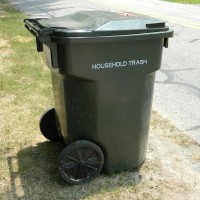Orange County Commissioners on Tuesday backed away from a plan to create a solid waste service district tax to pay for rural recycling pick-up.
“It seems clear to me at least, that a one-size-fits-all solution is not ideal,” said Commissioner Mark Dorosin.
The board side-stepped a vote on the proposed district tax in favor of what members called a more wholistic approach.
“On the 13th we’re going to be discussing a draft inter-local agreement which would bring us back into partnership, after several years, with our municipal partners,” said Board Chair Barry Jacobs. “That’s the time to start talking about what all of our options are, how they fit together, how they would be funded, to look at new ideas.”
The district tax would have replaced a fee the county attorney told the board it no longer has authority to levy. The rural curb-side recycling program currently serves about 13,700 homes, but funding runs out in July.
Residents of suburban areas outside Chapel Hill and Carrboro supported the district plan as a way to continue curb-side pick up. But rural residents protested, saying the service is not suited to areas with long driveways and no curbs.
Despite two crowded public hearings and a slew of emails, board members could not agree on the level of public support for the plan.
“I have to say that most of the emails I received were in favor of the tax,” said Penny Rich. “Most of the emails I received are people that wanted to take advantage and continue using the recycling.”
“I must be on a different email list, because the emails I received ran two to one against the tax,” Earl McKee replied.
Unlike the towns of Chapel Hill and Carrboro, Orange County does not currently host a public email archive online. However, Jacobs proposed posting all emails related to the solid waste service district tax plan on the county website for readers to draw their own conclusions.
Only one member of the public spoke at Tuesday’s meeting. Bonnie Hauser, who is challenging Jacobs for his at-large seat on the board, called for the creation of a work group of citizens and elected officials to sort through solid waste issues.
“Please consider finding a simple way to fund rural curbside recycling for the short-term, possibly using reserves or the General Fund,” said Hauser. “Second, start a work group with professionals and citizens from the towns and county to work together over the next year or so to explore services, costs and fees for trash and recycling services.”
Though no board member called for a vote on either the district tax plan or its alternative, an opt-in subscription service, some, including Bernadette Pelissier, expressed frustration that the matter remains unresolved.
“While I understand that many of my colleagues want to have further conversations, and there may be fruitfulness to it, we are going to have an inequitable situation that’s going to be aggravated by not making any decision about some way to do this,” said Pelissier.
County leaders must still decide how to fund the program for at least the next year, and whether to move ahead with the purchase of roll carts.
The board will discuss the future of solid waste disposal, potential partnerships with the towns and the question of rural recycling in particular, at meetings scheduled for May 8 and 13.




Comments on Chapelboro are moderated according to our Community Guidelines